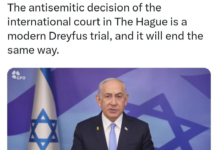Being Muslim and being British are two exclusive identities, writes Zafer Iqbal.
Anyone old enough to remember the 1990s would remember how Muslims were asked to demonstrate their loyalty to Britain and the debates that followed. As ever, we collectively fudged the results, disingenuously passing ourselves off as “British Muslims”.
What this meant, none of us really had much of a clue; but who cared? Questioning “Britishness” even became a taboo.
Muslims felt a deep discomfort when the issue arose from time to time. Remember the controversy surrounding the “Happy Muslim” video? Or the latest ideological project, British Muslim TV?
We prefer to bury our heads in the sand, maintaining the pretence that we are “British Muslims”.
However, the events surrounding schools in Birmingham took an unexpected turn, reviving those questions once again.
Trojan Horse, secular values and Britishness
Subscribe to our newsletter and stay updated on the latest news and updates from around the Muslim world!
Following the publication of Ofsted reports of an alleged “Trojan Horse” plot in Birmingham schools, Education Secretary Michael Gove had the audacity to demand Muslims to adopt and teach “British values” instead of their traditional values.
None of the prominent establishment-selected Muslim commentators dared to challenge this.
It took a widespread derision of “British values” across social media to force Prime Minister David Cameron to try clarifying what Gove meant. He patronisingly told us British values included equality, freedom, respect of the law and tolerance. Whilst they may not be particularly British, the fact they were rooted in British history and culture, we were told, was what made them British.
 Menacingly Cameron told us the government would adopt a “muscular liberalism” to ensure these values were adopted – repeating the threat from his Munich 2011 speech.
Menacingly Cameron told us the government would adopt a “muscular liberalism” to ensure these values were adopted – repeating the threat from his Munich 2011 speech.
This led to further confusion with the usual suspects from the Muslim Council of Britain (MCB) and other similar organisations subserviently professing their “Britishness”.
Journalist Peter Hitchens, a Christian Conservative, addressed the issue head on – expressing outrage against demagogues attempting to bully the country into conforming to a secular liberal ideology and disgracefully labelling opponents as extremists; he demanded they back down.
However, he failed to notice that the veiled threats were primarily targeted at Muslims and not all Brits. Although we pay superficial lip-service to the notion we have never adopted the British identity and values.
It then begs the question, what do these terms mean and can Muslims adopt them?
Identity and values
Such terms are notoriously difficult to pin down. Not only do they have varying contextual usages, they are highly elastic and contested.
“British” is commonly used to mean “nationality”, usually evidenced by a passport. It is often used in a geographical sense too, denoting where one lives, one’s homeland.
The term’s core usage however refers to a nation’s collective identity, arising from a socio-cultural phenomenon, the loyalty people feel to their nation, people, region or religion.
Professor Anthony Smith, the founder of Nationalism Studies at the London School of Economics (LSE), details how ethnic origins, religion, language and shared symbols over time lead to a sentimental sense of nation by its members. His research concludes a national identity is “a named community possessing an historic territory, shared myths and memories, a common public culture and common laws and customs”.
Whilst national identities exhibit many positive aspects, when politicised, they can become pernicious. The ideology of nationalism argues a nation’s identity should be the basis of a polity – adopted as the basis for nation states emerging post-Westphalia in Europe.
Add to this toxic ideology values from secularism, capitalism, liberalism and a host of other ill-conceived doctrines, you will get the idea where Cameron and Gove are going with this when they talk about British identity and values.
What is Britishness?
British national identity comprises a given common homeland, memories, culture and political rules.
The homeland broadly comprises the British Isles and colonial territories like the Falkland Islands.
Collective memories would include ancient Britons, Celts, Angles, Saxons, Romans, the French and Hanoverian monarchs, along with events like the 1215 Magna Carta, English Civil War, Industrial Revolution, British Empire, World Wars and historical figures like Henry VIII, Shakespeare, Newton and Churchill.
The collective culture would include football, fish and chips, pubs, BBC, Eastenders, The Sun, Christmas and the English language whilst the Union Jack, House of Parliament, Big Ben, the royal family and British law would be amongst its political symbols.
Can Muslims be British?
One has to consider what an Islamic collective identity would look like.
History starts with Adam (as), succeeded by generations to whom God sent messengers and prophets, with the final messenger being Muhammed (saw) and Islam being the final code.

The Ummah’s memories add to this history – the Prophet’s rule in Medina, followed by the Khulafah Rashida, Ummayads, Abbasids, Mughals and Ottomans. Historic heroes include the companions, Abu Hanifa, Malik, Shafi’i, Ahmed bin Hanbal, Bukhari, Sibawayh, Salahudeen al Ayubi, Ghazali, Ibn Khaldun, Muhammad al-Fatih, Aurangzeb and Abdul Hamid II.
The collective culture includes prayers, halal food, hijab, Eids, Ramadan, Hajj, respect for the elderly, honour, patience, nikah, circumcisions, God consciousness, tajweed and the Arabic language.
Political symbolism would require a Caliph as the single leader of the Ummah, the Shariah as law, qadis, bait ul-mal, the Prophet’s flag and armies of jihad fighting tyranny.




















